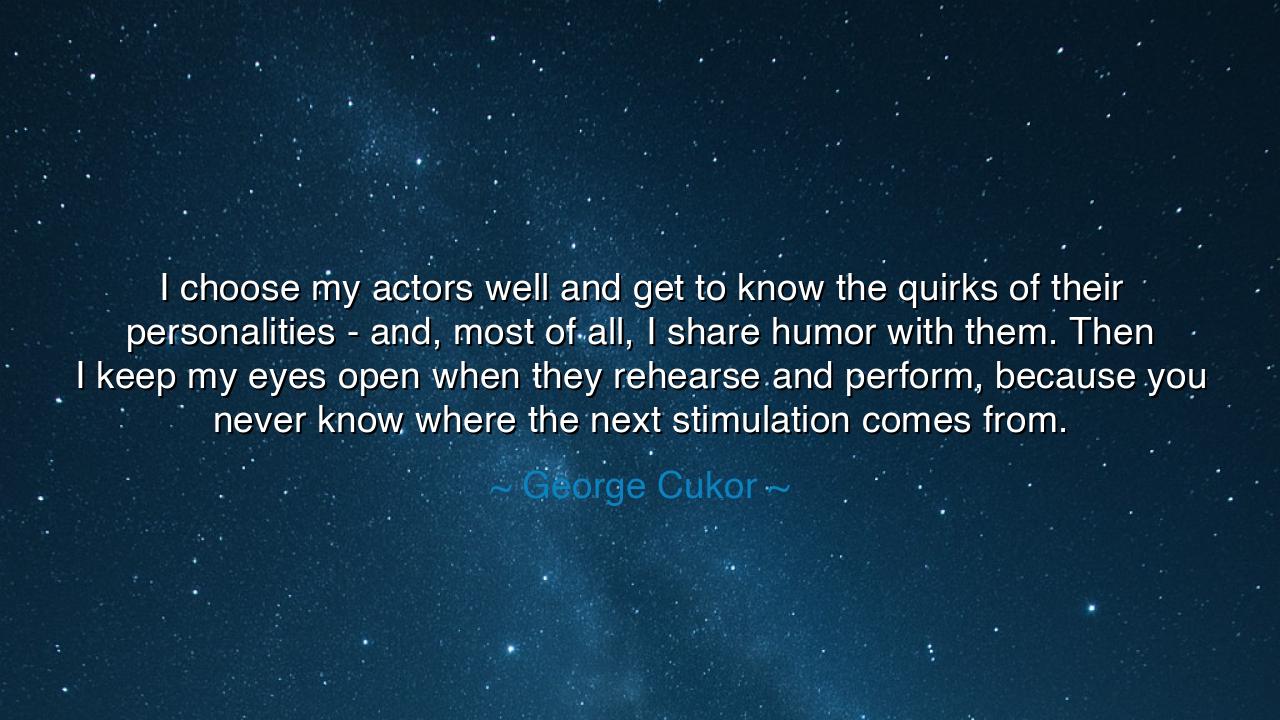
I choose my actors well and get to know the quirks of their
I choose my actors well and get to know the quirks of their personalities - and, most of all, I share humor with them. Then I keep my eyes open when they rehearse and perform, because you never know where the next stimulation comes from.






In the world of creation, where art and the human spirit intertwine, there is a sacred understanding that true excellence comes not just from technique, but from the very souls of the individuals involved. George Cukor, the great director, speaks to this truth when he says, "I choose my actors well and get to know the quirks of their personalities - and, most of all, I share humor with them. Then I keep my eyes open when they rehearse and perform, because you never know where the next stimulation comes from." In these words, Cukor imparts a profound lesson about the nature of art and collaboration: that the most powerful performances come not from control, but from the freedom to explore, to connect, and to discover together.
In the ancient world, the great creators and visionaries understood that the key to success lay not only in their own vision, but in the collaboration with others. Plato, in his dialogue The Republic, spoke of the artist as one who must understand both the craft and the soul of those they work with. The most impactful works of art, whether in theater, sculpture, or philosophy, were those where the creator recognized the unique qualities of the individuals involved and allowed their personalities to infuse the work with depth and vitality. Cukor’s wisdom reflects this ancient ideal—understanding that an actor is not a puppet to be controlled, but a collaborator whose quirks and humor bring the performance to life.
The actors in Cukor’s world were not mere vessels of his direction, but partners in the creation of something greater. Consider the story of Shakespeare, whose plays not only reflected the complexity of human nature, but were alive with the personalities of the actors who performed them. In his time, the great actors of the Globe Theatre brought their own nuances, humor, and idiosyncrasies to the roles they played. Shakespeare understood that a play was not simply the written word, but the performance, the spirit of the actor, and the chemistry between those on stage. Similarly, Cukor, by embracing the quirks of his actors, acknowledged that their humanity was essential to the work. It was not just the script that mattered, but how each actor breathed life into it.
Furthermore, Cukor speaks to the importance of humor in the creative process. Humor, as the ancients knew, is not just a fleeting emotion, but a force that transcends the mundane and allows for deeper connection. Aristophanes, the ancient Greek playwright, was a master of using humor to reveal the complexities of human behavior, whether in his comedies that mocked the leaders of Athens or in his more subtle critiques of society. Humor, in this sense, becomes not only a tool for entertainment, but a means of illumination, helping both performer and audience navigate the absurdities of life. Cukor understood that by sharing humor with his actors, he was creating a bond that would fuel their creativity, allowing the work to evolve in unpredictable and authentic ways.
The lesson that Cukor imparts is one of trust and openness. As a director, he did not seek to impose his own vision upon his actors, but rather sought to bring out the best in them by understanding who they were, what made them unique, and how their individuality could enhance the performance. Cukor kept his eyes open, not just for the performance, but for the unexpected moments—those moments where the spark of creativity ignited and the actors, in their freedom, brought something new and unexpected to the work. In this way, art becomes not a rigid structure, but a living, breathing entity, shaped by the collaboration of many voices and perspectives.
Consider, too, the example of Michelangelo, whose masterpiece, the David, was not the product of a single-minded pursuit, but of a relationship between the artist and the marble, the vision and the material. Michelangelo once said that he simply "liberated" the form from the stone. He did not impose his will upon it, but allowed the stone itself to guide his hand, just as Cukor allowed his actors the freedom to express themselves. Michelangelo’s greatest works were not just an expression of his own genius, but of the dialogue he maintained with his medium and the people around him.
In our own lives, this lesson teaches us the importance of collaboration and freedom in our creative pursuits. Whether we are artists, teachers, or leaders in any field, we must understand that great work is not made in isolation, but in relationship. By valuing the quirks and individuality of those we work with, we allow them to bring their full selves to the task. We must also recognize the importance of humor, not as a distraction, but as a means of building connection and lightening the weight of the work ahead. Just as Cukor embraced the creativity of his actors, so too must we embrace the creativity and individuality of others in our own endeavors.
So, let us walk forward with humility and openness, remembering the lessons of Cukor and the ancients. Let us recognize the humanity in those we work with and give them the space to shine. Let us share in the laughter that fuels our endeavors, and keep our eyes wide open for the unexpected moments that will elevate our work to something greater than we could ever imagine. In this way, we will not only create beautiful works, but we will build lasting connections and discover new depths of meaning in the journey.






AAdministratorAdministrator
Welcome, honored guests. Please leave a comment, we will respond soon